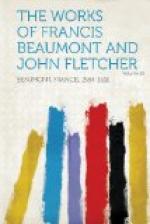Which nothing now presents unto the Eye, But
in Dumb-shews her own sad Tragedy. ’Would
there had been no sadder Works abroad, Since her
decay, acted in Fields of Blood. But to the
Man againe, of whom we write, The Writer that
made Writing his Delight, Rather then Worke.
He did not pumpe, nor drudge, To beget Wit,
or manage it: nor trudge To Wit-conventions
with Note-booke, to gleane Or steale some Jests
to foist into a Scene: He scorn’d those
shifts. You that have known him, know The common
talke that from his Lips did flow, And run at waste,
did savour more of Wit, Then any of his time, or
since have writ, (But few excepted) in the Stages
way: His Scenes were Acts, and
every Act a Play. I knew him in his
strength; even then, when He That was the
Master of his Art and Me Most knowing Johnson
(proud to call him Sonne) In friendly
Envy swore, He had out-done His very Selfe.
I knew him till he dyed; And, at his dissolution,
what a Tide Of sorrow overwhelm’d the
Stage; which gave Volleys of sighes to send him
to his grave. And grew distracted in most violent
Fits (For She had lost the best part of her
Wits.) In the first yeere, our famous Fletcher
fell, Of good King Charles who graced
these Poems well, Being then in life of Action:
But they dyed Since the Kings absence; or were layd
aside, As is their Poet. Now at the Report
Of the Kings second comming to his Court,
The Bookes creepe from the Presse to
Life, not Action, Crying unto the World,
that no protraction May hinder Sacred Majesty
to give Fletcher, in them, leave on the
Stage to live. Others may more in lofty
Verses move; I onely, thus, expresse my Truth and
Love.
RIC. BROME.
Upon the Printing of Mr. JOHN FLETCHERS workes.
What meanes this numerous Guard? or do we come To file our Names or Verse upon the Tombe Of Fletcher, and by boldly making knowne His Wit, betray the Nothing of our Owne? For if we grant him dead, it is as true Against our selves, No Wit, no Poet now; Or if he be returnd from his coole shade, To us, this Booke his Resurrection’s made, We bleed our selves to death, and but contrive By our owne Epitaphs to shew him alive. But let him live and let me prophesie, As I goe Swan-like out, Our Peace is nigh; A Balme unto the wounded Age I sing. And nothing now is wanting but the King.
JA. SHIRLEY.
THE STATIONER.
As after th’ Epilogue there comes some one To tell Spectators what shall next be shown; So here, am I; but though I’ve toyld and vext, ’Cannot devise what to present ’ye next; For, since ye saw no Playes this Cloudy weather, Here we have brought Ye our whole Stock together. ’Tis new and all these Gentlemen attest Under their hands




